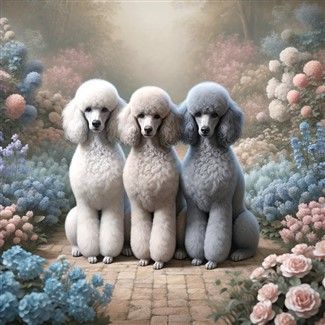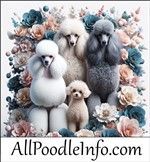Standard Poodle

Stat Information
Appearance
Colors
Care Information
Standard Poodles, while very graceful and elegant are large enough to handle long walks and hard play. When they are still puppies, care must be taken of course, to prevent injury from rough play and jumping from heights.
Since this breed is prone to tooth decay, dental care at home along with yearly professional care. Even so, it is not uncommon for a senior, old standard to have one or two missing teeth. Proper feeding of wholesome foods for both main meals and snacks will help to ensure a happy and healthy dog and that is able to reach his expected life span of 10 to 14 years. Learn more about: Poodle Care Tips.
Temperament
Health Issues
Related Article:
Comparison of Toy Poodle vs Miniature vs Standard Poodle: A helpful summary comparing the 3 sizes of Poodles (AKC recognized) including temperament and health. And a summary of what the three sizes have in common.
Articles:
Poodle Feeding Guidelines: This extensive article covers all important aspects including scheduling, wet vs dry, grain vs grain-free, homemade food vs kibble, meals, snacks and treats, and more. This is for Poodles of all sizes and ages.
Poodle Car Seats and Seat Belt Restraints: If your Poodle has trouble being comfortable in the car or you're not sure of the safest way to transport your Poodle, this article is for you. This covers both car sickness, along with treatments, and the best car seats and seatbelt restraints.
The Best Toys for a Poodle: From chew toys for rambunctious teething puppies to toys to help Poodles with separation anxiety, we have an great list for Poodles of all sizes and ages.
